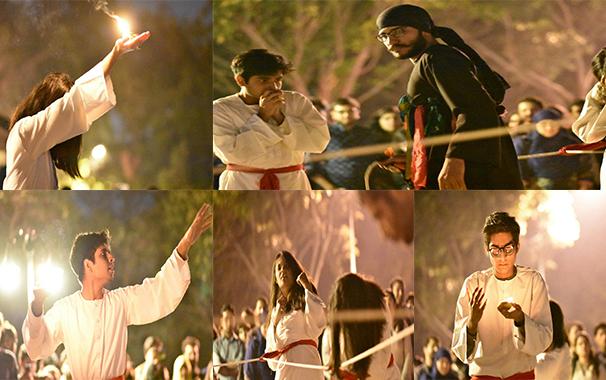
On November 15, 2018, the inaugural performance of Khoka Natak was held at LUMS. It was the first of three performances to be held in the month of November. An initiative of Gurmani Centre, Khoka Natak has been organised and directed by Waqas Manzoor, currently pursuing his MEd at LUMS. He has an extensive experience as a theatre artist, having previously worked with Alhamra Arts Council on several productions, and now aims to bring street theatre to the fold of LUMS.
What makes Khoka Natak exciting is that, as demonstrated through its reception that evening, it transforms the khoka into a performative space, and prods students out of their modes of casual interaction.
For the first performance, Waqas had his performers enact and recite Faiz Ahmed Faiz’s ‘Subh-e-Azadi’. He chose Faiz’s poetry for his first performance because he believes that Faiz’s work captures the true, unrestrained spirit of street theatre. Additionally, Waqas is also interested in reshaping the notion that a good theatrical performance needs to be backed up by the mechanical functions of the stage.
The event began with the setting up of a large circle of diye, which the seven performers, student volunteers Esra Faisal, Sheher Bano, Qazi Ali Kamal, Uswa Mehmood, Usama Yasin, Hammad Bilal and Hamza Iqbal, performed in. Six of the performers were dressed in a traditional white kurta with a red sash around their waist. One of the performers was dressed in black.
By the time the performance began, it had attracted a large number of spectators, so much so that many of them were climbing atop the tables to get a better view of the performance. Once the performers entered the ring of diye, they stood in a circle and proceeded to recite the poem, alternating its tone and urgency and pairing this with dynamic, synchronised movements. In the background, a lonesome but resonating drum beat echoed. In a span of 15 minutes, both the performer and audience gasped, flinched, lost their breadth, went into a frenzy and were drawn into a spell. Some viewers shied away, others were pulled in to marvel. When the performance ended, a round of applause ensued, and the audience scattered but a subtle transformation had come about. The eased interaction between students from mere minutes ago was now gripped by an energy; there was a desire for discussion, to process and understand what they had just witnessed.
In spirit with this desire to bring about new experiences for its students, Gurmani Centre will continue its endorsement of the varied Khoka Natak events in store for the rest of the year.








